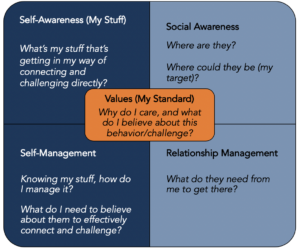Surviving—and Thriving—in the Pandemic with Emotional Intelligence
We at the Noble Story Group want to contribute during the pandemic, and we have decided that we can do the most good by sharing our expertise. In our work as leadership coaches, we apply the concept of emotional intelligence (EI), popularized by Daniel Goleman (1995), to help people deal with all kinds of social-emotional challenges. We think what we have learned can help us all not just survive but thrive during this crisis.
To share, we are launching an on-line series called “The 5-Square Social-Emotional Survival Guide,” which is intended to address the “below the surface” work that is essential to support thriving, both at home and at work.
The logistical challenges we face now are daunting, but our social-emotional challenges below the surface affect everything we feel and do every day. As we transition to remote work, we may feel that we are losing energizing social contact with the outside world while also bringing work challenges into our homes. Work stress and home stress may interact in new ways, perhaps even colliding, given the limited physical space we inhabit (now 24/7 for most!) with our families. Meanwhile, people around the world that we love are in danger of contracting a life-threatening illness and losing jobs and nest eggs. Those of us at lower income levels face additional health care, food scarcity, childcare and other challenges as well.
And yet, where there is challenge there is opportunity. The disruption of old structures, patterns, narratives, and habits creates unprecedented opportunity to re-evaluate how we live and work. Our goal in this series is to support you to raise your own awareness and develop strategies to access your social and emotional power in new ways. We also hope that you will share what you learn with your family, friends and co-workers to help us all collectively live into our potential.

Zooming in through the lens of Emotional Intelligence
There are four domains in Goleman’s EI model: self-awareness, self-management, social awareness, and relationship management. The first two are focused on self, and the last two are focused on others.
- Self-awareness includes our connection to our values intuition and what drives us, as well as our awareness of our internal obstacles and our awareness of how others perceive us.
- Self-management is our ability to leverage our values, intuition and drivers while also managing our internal obstacles, in order to show up as our most effective selves.
- Social awareness turns our focus from self to others. It is our ability to understand—to really see—what other people and groups care about and what they need.
- Relationship management is the culmination of the domains that precede it. Once we are managing ourselves and can see others clearly, we are able to choose the most effective approaches to engage them in the moment to meet their needs and to achieve our goals.
For over a decade now, we have helped leaders develop emotional intelligence first by building their awareness of self and others, and then by helping them to generate new self-management and relational strategies. We do this through the framework of our coaching tool, the 5-Square. The 5-Square is comprised of the four domains above, with the addition of values in the center.
One challenge we coach and train on regularly is managing chronic stress, which Goleman refers to as the “neurobiology of frazzle.” Usually we are supporting people to strengthen their self-awareness and self-management through the heavy, unending emotional challenges that cause chronic stress and burnout. We help people see that, while sacrifice is inevitable, they must also intentionally practice renewal to be successful and live full lives over time. Then we guide them to build personal practices and mindsets that help them recharge.
What we are all experiencing right now is a new kind of chronic stress. Cumulatively, at best, our experience will amount to constant low-level stress, and at worst, potentially life-altering episodes of stress. They will require us to call on our emotional intelligence in new ways to renew. The good news is that the more we are self-aware of our unique obstacles, and the more we intentionally manage ourselves to live into the practices that recharge our batteries, the more likely we are not just to survive, but also to thrive.
Getting Started with a Focus on Family
We look forward to taking you on a tour of the 5-square as we turn our attention to our families. In our next piece, we will discuss how to talk about self-awareness and self-management as a family to stay grounded and connected in our new remote work and school realities.
Stay tuned. Take care.
Anne, Keith and Matt
